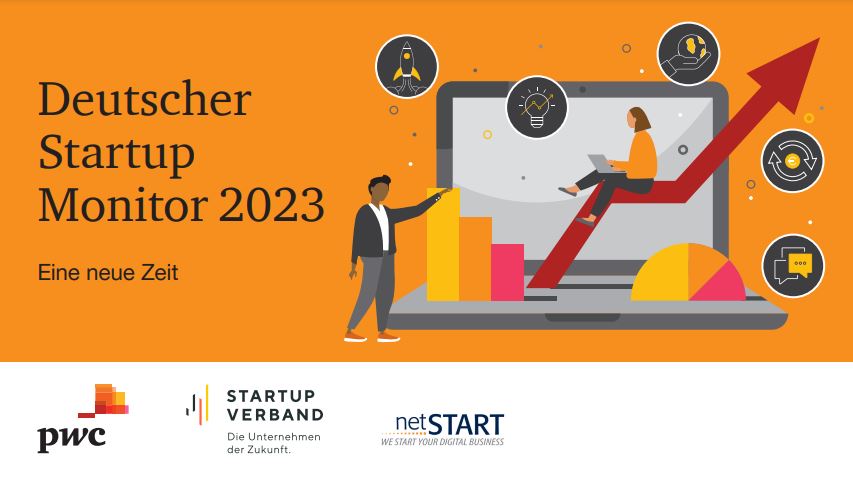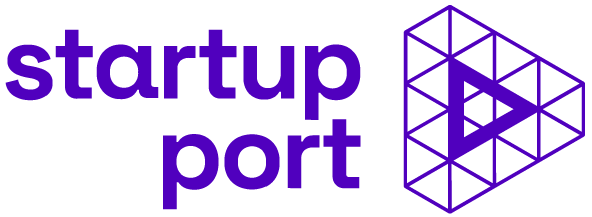The startup business climate continues to cool down, the investment climate is difficult and there is a reluctance to invest in venture capital. But there is also good news: After the number of start-ups fell significantly in 2022, more new start-ups emerged again in the first half of 2023. And the founders are relatively unimpressed by the difficult situation: Nine out of ten say they want to start up again – 83 percent of them here in Germany. This is why start-up support networks such as the Startup Port are so important.
With almost 2,000 respondents, the German Startup Monitor (DSM) by the Startup Association and PwC Germany is the most comprehensive study on the startup landscape in Germany. Last year, the topic of “Startups and innovation in uncertain times” was examined: Many of the challenges remain or have even worsened: weak economy, inflation, interest rate turnaround and reluctant investments. Although financing has stabilized, it is still below the level of 2022 and 2021. Between inflation, the turnaround in interest rates and the economic slowdown, the mood among German founders continues to cool – the business climate is only just above the previous low point in the coronavirus year 2020.
In addition to the business situation, the general assessment of the startup ecosystem has also deteriorated and, at 58% positive, is ten percentage points below the previous year’s figure. This leads to the following conclusion: The innovation ecosystem in Germany is currently under pressure – but the German Startup Monitor 2023 also shows that founders in this country are facing up to these challenges and breaking new ground. The vast majority of startups remain on course for growth, are pursuing ambitious goals and are facing up to the current challenges. This determination and the growing confidence of founders to take the plunge into self-employment again – especially in Germany – underline the importance of platforms such as Startup Port. With centralized access to start-up support units, Startup Port offers not only essential resources, but also a strong network to back founders in the Hamburg metropolitan region. In an uncertain climate, Startup Port is a crucial anchor point that offers stability, trust and support. In view of the transformation process that the entire German economy is undergoing, this is good news, as startups are making an important contribution here.
Founders adapt growth strategy
Since the record financing year 2021, it has become more difficult for start-ups to raise capital – in view of the new financing environment, only 15 percent of founders currently rate the willingness of VCs and business angels to invest positively. Many are also adapting their strategy: While 44 percent of startups still preferred venture capital financing in their planning last year, this figure has dropped significantly to just over a third. At the same time, the issue of liquidity is once again becoming more of a focus and is currently a key challenge for around a third, compared to a quarter in the previous year. This primarily affects the faster-growing start-ups, as larger financing rounds are becoming more difficult.
Startups assert themselves as an economic factor
Despite the many challenges, there is no sign of a slump in the development of the startup ecosystem: The average number of employees in German startups remains stable at 19. 15 percent of startups have had to make redundancies within the last year, but in the same period the vast majority (56 percent) were able to continue hiring and create an average of eight new jobs. There is also no sign of frustration among founders – nine out of ten would found a startup again and the vast majority of these would do so in Germany (83%). This confirms the general assessment that times of crisis are also times for start-ups.
Unlocking development potential through more female founders
Following steady growth in the proportion of female founders in previous years, the figure has barely changed this year and stands at 21%. Particularly in difficult times, progress in the area of diversity seems to fall by the wayside. In the competition for scarcer resources, networks can play an important role, which threatens to increase barriers to entry for women. It is particularly important now to attract as many talented people as possible and therefore significantly more women to the innovation ecosystem. This is because the diversity effect is increasing within the company: For example, the proportion of female employees (44 percent) and managers (40 percent) in mixed start-up teams is significantly higher than in all-male start-up teams (29 percent and 14 percent respectively).
Universities and research institutions as drivers of innovation
Universities and research institutions are fundamental for many start-ups: 49% of start-ups state that they have already received support in this context. The focus here is on providing contacts and business expertise as well as support from individuals such as professors. Universities and research institutions play a central role for the start-up ecosystem, especially with regard to competitiveness in innovative technologies. The development in the field of artificial intelligence is particularly noteworthy here: the proportion of startups for which AI has a major impact on their business model has risen significantly again compared to the previous year, from 45% to 52%.
Further findings from the German Startup Monitor
- The proportion of startups with collaborative relationships with the established economy continues to fall: in 2020 it was 72%, today it is only 61%.
- 82% of start-ups use tools such as ChatGPT – generative AI is used particularly frequently in marketing (64%).
- 47% of startups see themselves as part of the green economy and want to make a contribution to climate and environmental protection, 42% more than in 2018.
- On average, founders have seven other founders in their circle of friends; in the hotspots of Berlin (12) and Munich (11), the networks are even stronger.
- The number of German Unicorns has more than quadrupled to 33 since 2018 – but in an international comparison, we are still well behind locations such as the USA or Israel on a per capita basis.
- The hotspot Berlin has been hit harder by the current turbulence and funding bottlenecks: 24% of start-ups here had to make redundancies last year, compared to a national average of just 15%.
- RWTH Aachen University, TU Munich and WHU are the top 3 start-up universities – 13 percent of the founders surveyed graduated from these institutions.
The detailed German Startup Monitor 2023 can be found here.
About the Startup Association:
The Startup Association has almost 1,200 members and was founded in Berlin in September 2012. The association sees itself as the representative and voice of startups in Germany: it represents the interests, viewpoints and concerns of startup companies vis-à-vis legislation, administration and the public. It promotes innovative entrepreneurship and aims to promote the startup mentality in society. The association sees itself as a network for startups in Germany.

